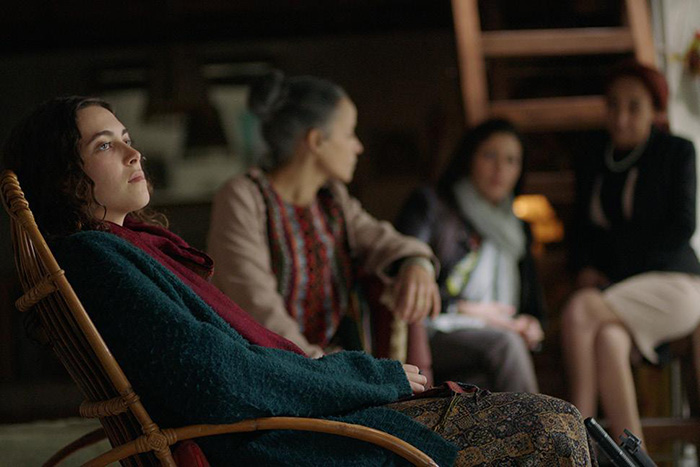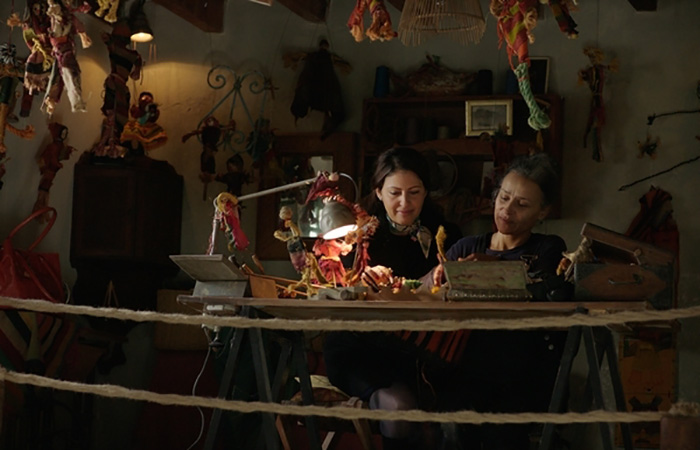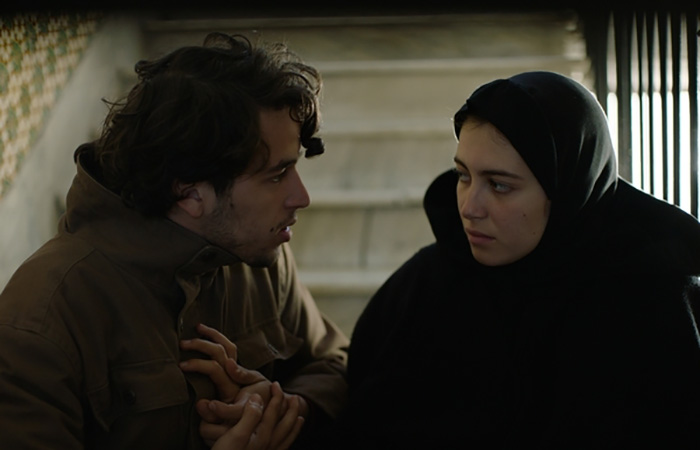It begins in a prison cell with a despondent Djo (Joumene Limam) scribbling words on paper as Zina (Nour Hajri) implores her to stand so they may leave. Salvation comes in the form of a lawyer (Afef Ben Mahmoud’s Nadia) and doctor (Fatma Ben Saïdane’s Dora) desperate to figure out what has happened and how they were able to return to Tunisia. Details about this question only start to come into focus as Nouri Bouzid’s The Scarecrows progresses with the explanation that the two women were held captive in Syria by Islamist extremists—sex slaves for the soldiers who raped and impregnated them before removing their children. From one prison to another, their homecoming is met by civil animosity declaring them “damaged goods” and terrorists themselves.

Bouzid says that making this film was his opportunity to shed light upon those victims who’ve been walled off and erased from telling their stories. It makes sense too considering Tunisia is now the only democratic country in Northern Africa with women holding government positions to expunge archaic laws allowing for domestic abuse. Being that sharia law was a main part of its legislation not so long ago, however, atrocities don’t simply disappear overnight. These monsters adapt by denouncing terrorism in public while secretly “marrying” unsuspecting young women in private to sell across the border to ISIS. The girls’ parents see their leaving as voluntary—disowning them for the disgrace they’ve bestowed upon the family. Only survivors can set the record straight and bring their captors to justice.
This is Nadia’s goal. While Djo is a journalist who sought to expose what’s happening before getting caught up as a captive herself (her scribblings are the pages of a book about the “Halal rape” occurring under her nation’s nose), Zina was a victim of the scam. Whether or not she knows her “husband’s” surname (Ghanem Zrelli’s Salmane) is undecided, however, because her fear for what might happen and the uncertainty of whether he actually sold her or was killed in battle weigh heavily upon her mind. Nadia needs facts to make her case, but the bedside manner used leaves something to be desired once Zina wonders if even her lawyer believes she’s guilty anyway—like her father (Noomen Hamda) and those calling her “slut” in the streets.

Djo’s now mute and suicidal shell is left in the care of Zina’s mother (Sondos Belhassen), a woman wrestling with her own interpretation of what’s happened due to knowing her daughter wasn’t fully aware of her circumstances and yet still blaming her for going. Zina is conversely left to her own devices against better judgment because nobody can get her to follow their advice. The more demanding they get, the further she wants to go to get away from them despite the danger of walking alone with a face plastered all over the news. Nadia hopes Zina will share with another client of hers named Driss (Mehdi Hajri) because his own persecution for being a homosexual (still illegal in Tunisia today) might help a kinship form.
The result is a tough, emotional drama that explores the precarious position someone like Zina finds herself in. Women like her don’t just get to leave captivity and go back to their lives. They’re either stuck in their prison or killed for any attempt to flee. And when those back home want her dead too, how can she be expected to trust anyone? She’s scared to death of what might happen to her and those with the means to find her are scared of what she might say (Salmane) and what she now stands for (her father). The memories of what occurred gradually come back and it wouldn’t be wrong to assume her recklessness is a death wish to make them stop. “Normal” isn’t possible for her future.

Mahmoud does a good job playing a role that is both heroic (Nadia’s humanitarian work) and villainous when you look to see how many of her actions are selfishly motivated and in turn potentially fatal for her client. With Salmane off-screen as the face of Zina’s abuse, we need this type of antagonistic character to push the lead away from isolation and into spaces that will both trigger her memories and risk creating more. Mehdi Hajri is a nice contrast because he sees this reality and knows Nadia means well even if she’s overzealous in those pursuits. While he will relay some of what he learns from Zina, he’ll keep a lot to himself too in order to build real trust. He’s truly the only friend she has.
Djo remains in the picture, but she’s on the brink of oblivion and unable to help. Limam gives a devastating performance made all the harrowing for our knowing she saved Zina’s life. If not for her strength, the latter wouldn’t be alive to prevent men like Salmane from kidnapping other young women susceptible to their charms as they look to claim agency over their bodies in a country of conservative men beholden to old traditions. And Nour Hajri demonstrates the heavy emotional and psychological toll existing in this purgatorial nightmare creates. Freedom in Tunisia comes with unwritten rules that continue subjugating women despite progress. Anyone who thinks Zina’s liberation from sexual bondage means she can breathe easy is naïve to the horror societies valuing reputation above truth possess.
The Scarecrows screened at the Venice International Film Festival.
